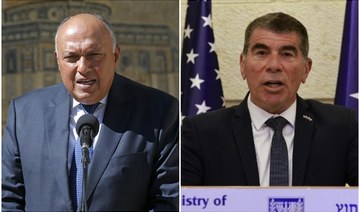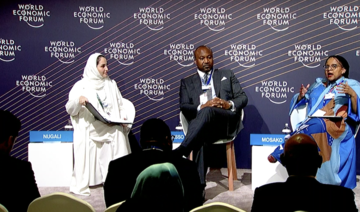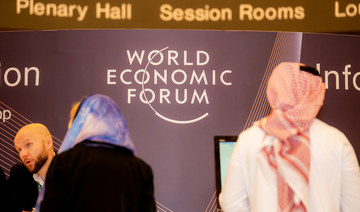CAIRO: Workers dig and ferry wheelbarrows laden with sand to open a new shaft at a bustling archaeological site outside of Cairo, while a handful of Egyptian archaeologists supervise from garden chairs. The dig is at the foot of the Step Pyramid of Djoser, arguably the world’s oldest pyramid, and is one of many recent excavations that are yielding troves of ancient artifacts from the country’s largest archaeological site.
As some European countries re-open to international tourists, Egypt has already been trying for months to attract them to its archaeological sites and museums. Officials are betting that the new ancient discoveries will set it apart on the mid- and post-pandemic tourism market. They need visitors to come back in force to inject cash into the tourism industry, a pillar of the economy.
But like countries elsewhere, Egypt continues to battle the coronavirus, and is struggling to get its people vaccinated. The country has, up until now, received only 5 million vaccines for its population of 100 million people, according to its Health Ministry. In early May, the government announced that 1 million people had been vaccinated, though that number is believed to be higher now.
In the meantime, authorities have kept the publicity machine running, focused on the new discoveries.
In November, archaeologists announced the discovery of at least 100 ancient coffins dating back to the Pharaonic Late Period and Greco-Ptolemaic era, along with 40 gilded statues found 2,500 years after they were first buried. That came a month after the discovery of 57 other coffins at the same site, the necropolis of Saqqara that includes the step pyramid.
“Saqqara is a treasure,” said Tourism and Antiquities Minister Khaled el-Anany while announcing the November discovery, estimating that only 1 percent of what the site contains has been unearthed so far.
“Our problem now is that we don’t know how we can possibly wow the world after this,” he said.
If they don’t, it certainly won’t be for lack of trying.
In April, Zahi Hawass, Egypt’s best-known archaeologist, announced the discovery of a 3,000-year-old lost city in southern Luxor, complete with mud brick houses, artifacts and tools from pharaonic times. It dates back to Amenhotep III of the 18th dynasty, whose reign (1390–1353 B.C.) is considered a golden era for ancient Egypt.
That discovery was followed by a made-for-TV parade celebrating the transport of 22 of the country’s prized royal mummies from central Cairo to their new resting place in a massive facility farther south in the capital, the National Museum of Egyptian Civilization.
The Red Sea resort of Sharm el-Sheikh is now home to an archaeological museum, as is Cairo’s International Airport, both opened in recent months. And officials have also said they still plan to open the massive new Grand Egyptian Museum next to the Giza Pyramids by January, after years of delays. Entrance fees for archaeological sites have been lowered, as has the cost of tourist visas.
The government has for years played up its ancient history as a selling point, as part of a yearslong effort to revive the country’s battered tourism industry. It was badly hit during and after the popular uprising that toppled longtime autocrat Hosni Mubarak and the ensuring unrest. The coronavirus dealt it a similar blow, just as it was getting back on its feet.
In 2019, foreign tourism’s revenue stood at $13 billion. Egypt received some 13.1 million foreign tourists — reaching pre-2011 levels for the first time. But in 2020, it greeted only 3.5 million foreign tourists, according to the minister el-Anany.
At the newly opened National Museum of Egyptian Civilization, Mahmoud el-Rays, a tour guide, was leading a small group of European tourists at the hall housing the royal mummies.
“2019 was a fantastic year,” he said. “But corona reversed everything. It is a massive blow.”
Tourism traffic strengthened in the first months of 2021, el-Anany, the minister, told The Associated Press in a recent interview, though he did not give specific figures. He was optimistic that more would continue to come year-round.
“Egypt is a perfect destination for post-COVID in that our tourism is really an open-air tourism,” he said.
But it remains to be seen if the country truly has the virus under control. It has recorded a total of 14,950 deaths from the virus and is still seeing more than a thousand new cases daily. Like other countries, the real numbers are believed to be much higher. In Egypt, though, authorities have arrested doctors and silenced critics who questioned the government’s response, so there are fears that information on the true cost of the virus may have been suppressed from the beginning.
Egypt also had a trying experience early on in the pandemic, when it saw a coronavirus outbreak on one of its Nile River cruise boats. It first closed its borders completely until the summer of 2020, but later welcomed tourists back, first to Red-Sea resort towns and now to the heart of the country — Cairo and the Nile River Valley that hosts most of its famous archaeological sites. Visitors still require a negative COVID-19 test result to enter the country.
In a further cause for optimism, Russia said in April that it plans to resume direct flights to Egypt’s Red Sea resort towns. Moscow stopped the flights after the local Islamic State affiliate bombed a Russian airliner over the Sinai Peninsula in October 2015, killing all on board.
Amanda, a 36-year-old engineer from Austria, returned to Egypt in May. It was her second visit in four years. She visited the Egyptian Museum, the National Museum of Egyptian Civilization and Islamic Cairo, in the capital’s historic center.
She had planned to come last year, but the pandemic interfered.
“Once they opened, I came,” she said. “It was my dream to see the Pyramids again.”
El-Rays, the tour guide, says that while he’s seeing tourists starting to come in larger numbers, he knows a full recovery will not happen overnight.
“It will take some time to return to before corona,” he said.
Egypt bets on ancient finds to pull tourism out of pandemic
https://arab.news/8uf74
Egypt bets on ancient finds to pull tourism out of pandemic
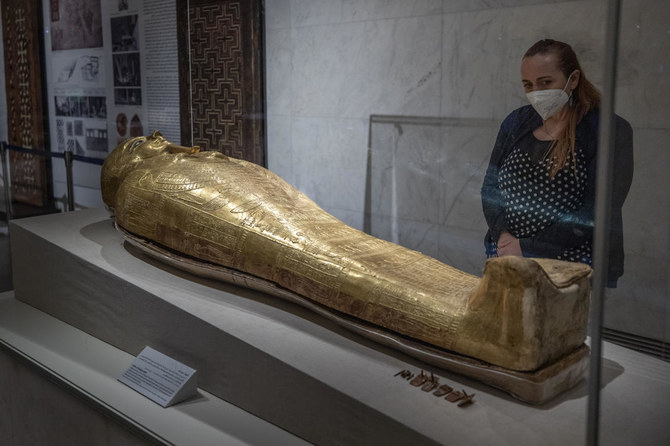
- Egypt continues to battle the coronavirus, and is struggling to get its people vaccinated
- The government has for years played up its ancient history as a selling point
Saudi Arabia committed to preserving environment, water resources, minister tells WEF
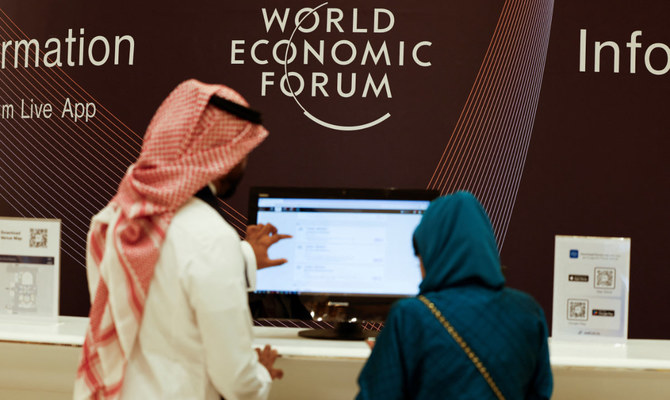
- Nation providing incentives for private sector to become more engaged, Abdulrahman Al-Fadley says
DUBAI: Saudi Arabia has detailed plans for the protection of its lands and environmental resources, the Minister of Environment, Water and Agriculture said on Sunday.
Speaking at the World Economic Forum in Riyadh, Abdulrahman Al-Fadley said: “We have devised our plans based on the preservation of our environment and the management of our water resources. The Kingdom is also providing incentives for the private sector to become more engaged and more responsible toward the environment.”
With 40 percent of lands around the world degraded and further degrading at an alarming rate, critical action is needed as the UN Convention to Combat Desertification COP16 is set to take place in Riyadh in December.
Al-Fadley said Saudi Arabia had preserved millions of hectares of land and set up programs for cloud seeding and increasing the number of dams in the country.
“This will not only be beneficial to the Kingdom but for the whole region,” he said. “With us hosting COP16 we are hoping to give the meeting the importance it commands. We don’t want matters to go back to the status quo after COP16 ends.”
Tariq Al-Olaimy, a member of the Global Shapers Community Foundation Board at the WEF, commended King Salman for his land restoration efforts.
“When you put nature first, you are equally putting people first,” he said. “Nature is our greatest collaborator … There is no successful growth story without successful land restoration and this starts inwardly, through our religion, community, values and moral clarity.”
Ibrahim Thiaw, secretary of the UNCCD, warned of global repercussions if the world did not pay heed to environmental safekeeping.
“Entire ecosystems are being destroyed through actions and inactions,” he said. “There has been a 29 percent increase in droughts in the past few years and that is affecting 1.8 billion people around the world. For poor nations that is disastrous and carries a large death toll of animals, people and agriculture. We have to be more proactive and not just emergency-ready. We must attempt to avoid emergencies.”
Thiaw said the Panama Canal’s functionality had been reduced by 12 percent, which was causing a problem for supplies.
“Demand is increasing while resources are shrinking,” he said. “As humanity we have been looking at resources as if they are unlimited. We have not been managing them. Companies need to reset their relationship with nature and we need to focus on land restoration to keep going.”
Naoki Ishii, director of the Center for Global Commons, had similar concerns.
“We are on a collision course,” he said. “The only solution is to modify our economic system. COP16 must be transformative for all of us. We need the political momentum to implement positive changes.
“If we are able to push those efforts, economically and ideally speaking, that will be a game changer.”
Saudi Arabia, UAE have world’s most ambitious decarbonization programs: WEF panel
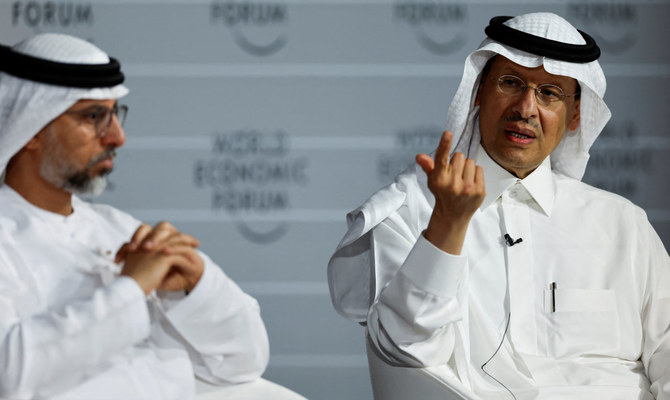
- “Solving sustainability problems requires technology and China has contributed greatly by increasing technical progress and making the cheapest energy available to the world”
DUBAI: A panel of ministers and experts gathered at the World Economic Forum in Riyadh on Sunday to discuss the road map for tripling renewables by 2030.
The UAE’s Minister of Energy and Infrastructure Suhail Mohamed Al-Mazrouei said his country’s goal would not only be reached but possibly exceeded by 2030.
“The UAE has been offering solar power to aid the world in reaching the goal of tripling renewables,” he said. “We have very few years until 2030, we need to work alongside and encourage countries to make the achievement by then.”
Li Zhenguo, president of Longi Green Energy Technology, said the Chinese government had been at the forefront of efforts to develop renewables.
“In 2023, China installed 216 solar power plants, which is more than 50 percent of the global capability,” he said.
“Solving sustainability problems requires technology and China has contributed greatly by increasing technical progress and making the cheapest energy available to the world.”
Marco Arcelli, CEO of Saudi-based ACWA Power, said he was surprised by the momentum in the region.
“Saudi and UAE have the most ambitious decarbs programs in the world. There is a speed and dimension you don’t see much elsewhere,” he said.
“There is leadership with a vision, there is cheap energy available and I believe you will start seeing greenshoring in the Kingdom by 2030. Lots of upcoming projects in the country, be it NEOM or others, will be solar driven and using renewable energy.”
Kuwait’s Minister of Electricity, Water and Renewable Energy Salem Alhajraf said there was a need to increase global production capacity.
“Innovative financing is key,” he said. “We need to move from small giga-sized projects to deploying renewables. Cities or towns with small populations can possibly have all their needs met by solar power.”
Stephanie Jamison, global Resources Industry Practices chair at Accenture, said her company had been developing guidelines for community engagement and nature transition.
“By conducting surveys and interviewing various CEOs, it has become clear that companies understand the impact they are making on nature. And so, partnerships between companies and proactive partnerships between companies and the community is one way to tackle challenges.”
Saudi energy minister, EU official discuss cooperation on clean energy
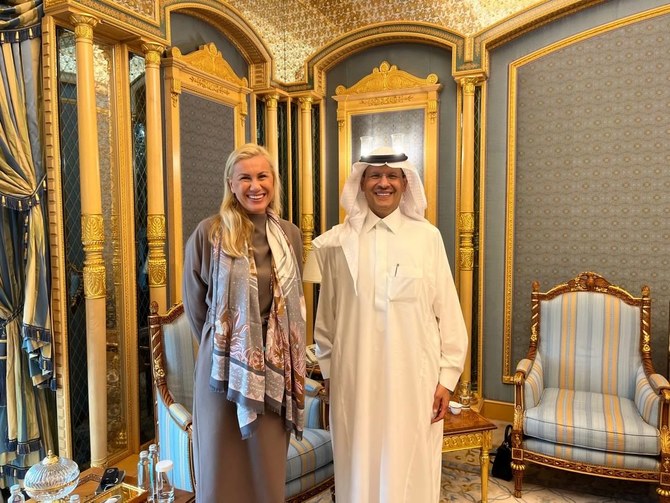
RIYADH: Saudi Energy Minister Prince Abdulaziz bin Salman on Sunday held talks with EU Energy Commissioner Kadri Simson to discuss prospects for cooperation in the field of clean energy.
The top officials met on the sidelines of the World Economic Forum in the Saudi capital, the Saudi Press Agency reported. They discussed ways to strengthen bilateral ties, boost cooperation for the promotion of green energy and advance the goals of the Paris Agreement and ensure the implementation of the outcomes of the COP28 held in Dubai last year.
The Paris Agreement is an international treaty on climate change that was adopted back in 2015. It was negotiated by 196 parties at COP21 in France and covers climate change mitigation, adaptation, and finance.
They reaffirmed the common goals of Saudi Arabia and the EU and the determination of both parties to accelerate private investment in the renewable energy sector, cooperate on electricity interconnection and the integration of renewables into the electricity grid.
The officials stressed the need to strength the electricity supply infrastructure through demand side management smart grid. They also discussed carbon capture, utilization and storage technology and opportunities for industrial partnerships in those sectors.
They also shared their view on building on the UNFCCC, the Paris Agreement and COP28 outcomes. The officials also discussed a Saudi-EU memorandum of understanding to boost cooperation in the energy sector.
According to SPA report, they were of the view that such an MoU should provide a solid and mutually beneficial basis for orienting and anchoring investment decisions in the energy and clean tech sectors, involve and mobilize stakeholders from the public, private and financial sectors, and lay the foundation for a more sustainable and secure energy future.
The European Commission and Saudi Arabia aim to conclude the MoU in the next few months.
Saudi Arabia to host 28th World Investment Conference in Riyadh
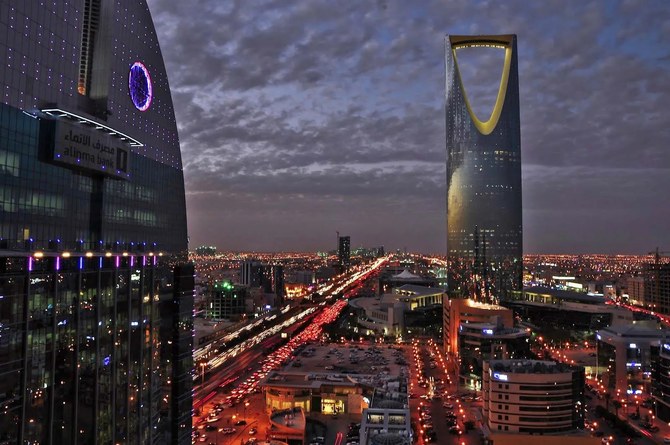
RIYADH: Saudi Arabia is on track to host the 28th World Association of Investment Promotion Agencies’ World Investment Conference from Nov. 25 to 27 in Riyadh.
The forum themed “Future-ready IPAs: Navigating digital disruption and sustainable growth,” will bring together leaders from investment promotion agencies, corporates, multilateral institutions, and other stakeholders to discuss global financial trends and opportunities, according to a statement.
The Kingdom’s selection as a host underscores its position as an international funding hub, according to Saudi Investment Minister Khalid Al-Falih.
“We are honored to be welcoming the global investment community to Saudi Arabia. Our strategic location at the crossroads of three continents, coupled with our world-class investment ecosystem and long-term political and economic stability, has seen the Kingdom develop into a global investment hub,” Al-Falih said.
“The World Investment Conference will serve as a platform to showcase our nation’s potential and forge partnerships that will shape the global investment landscape for years to come,” the minister added.
On WAIPA’s behalf, Executive Director and CEO Ismail Ersahin said: “WAIPA is honored that the 28th WAIPA World Investment Conference will be held in Riyadh, a city with a rich history and culture.”
Ersahin added: “With each edition, the WIC reaffirms its status as a guiding force for sustainable and inclusive development.”
He went on to stress how the conference is poised to be an impactful gathering aimed at the future readiness of IPAs.
Since 1995, the annual gathering has provided a forum for stakeholders to exchange insights and best practices and forge partnerships that drive economic development globally.
Human capital a ‘key challenge’ for Kingdom’s tourism sector, says Saudi minister
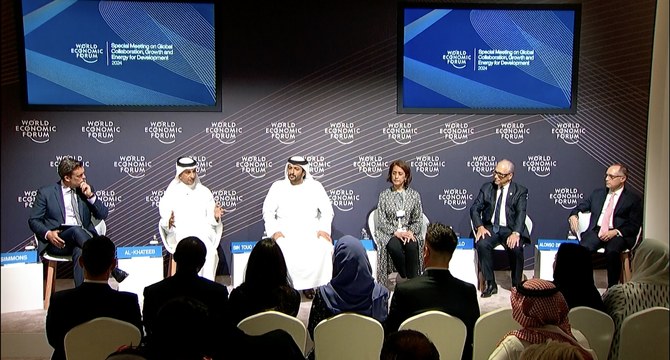
- Saudi Arabia's tourism sector is 'heading to achieve $80 billion this year' in private investment, Al-Khateeb told a WEF panel
LONDON: Developing human capital is a key challenge for Saudi Arabia’s travel sector, the country’s tourism minister has said on Sunday.
Ahmed Al-Khateeb, speaking during a two-day meeting of the World Economic Forum in Riyadh, discussed the Kingdom’s burgeoning tourism industry, which has boomed over the past half-decade.
To address the human capital challenge, the Saudi leadership has encouraged young people across the Kingdom “to join the sector,” he said.
“We are spending a lot to train (young Saudi talents) and scale them, and involve them in the sector,” he told the “Vacationomics” panel discussion, adding that hiring local experts is essential for delivering better tourism experiences.
“You get the best experience and you know more about other people’s culture and other nations’ cultures when you deal and interact with locals,” he said. “We want to make sure that our guests are served by local people.”
Saudi Arabia has delivered “strong growth in Q1 this year, and we are moving to deliver our 2030 numbers,” the minister said.
The Kingdom’s tourism sector “has come a long way” since the launch of the National Tourism Strategy as part of efforts to diversify the economy, Al-Khateeb said, adding that the industry is “heading to achieve $80 billion this year” in private investment.
Last year, Saudi Arabia attracted about $66 billion in private investment into tourism.
“We doubled the number of visitors coming from outside — 100 million in total … 77 million domestic (and) 27 million international,” he said. “This is double the number that we achieved before we launched our National Tourism Strategy.
“We have the funding. We have a great country. We have everything that the international tourists would like to see and experience.”
Jerry Inzerillo, chief of the Diriyah Gate Development Authority, told the panel: “What the Gulf and its leadership will do in the next 10 years is going to be breathtaking to allow people to come from all over the world.”
With “so much to do in the region,” Inzerillo said he believed the “warmth and hospitality” of the Saudi people is serving as a strong selling point for tourism in the Kingdom.
Though the traditional Gulf tourism market in Saudi Arabia is well developed, European tourism is “now activating” through new business with the Kingdom, he added.
“And as we sign more and more airline deals and… (the) Ministry of Tourism has done a brilliant job in getting bilaterals, you’ll see those numbers grow very exponentially.”
Other panelists included Abdulla Bin Touq Al-Marri, UAE minister of economy; Thiago Alonso de Oliveira, CEO of JHSF Participacoes; and Aireen Omar, president and CEO of RedBeat Capital.



